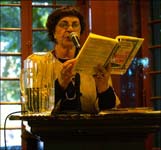Writer converts old murder into new thriller
The Daily Pennsylvanian
September 29, 2005
Linda Wolfe believes she has written a CSI for the 19th century.
That's one way Linda Wolfe described her latest book, The Murder of Dr. Chapman, a non-fiction crime story set in shadowy, 1830s Philadelphia. Wolfe read excerpts from the book and led a discussion about it last night as a visiting author to the Kelly Writer's House.
Evoking another modern analogy, Wolfe called the Chapman murder trial the "OJ Simpson case of its era." After the arsenic poisoning of a notable scientist, the trials of his wife and her lover, who was eventually hanged for the crime, became famous. At the time, unprecedented public interest in courtroom drama manifested itself in local newspapers, which had just begun to cover murder trials.
Research for the book, then, began with examining primary sources such as a copy of the 1831 trial transcript and newspaper microfilm. Wolfe read preserved letters at the Bucks County Historical Society and searched libraries in New York and Pennsylvania, including the University's.
Significant breakthroughs occurred at the Library Company of Philadelphia, an independent research library. There, Wolfe found newspaper ads Chapman and his wife Lucretia had placed, crucial footprints pointing to more evidence.
"Philadelphia is the most amazing city because it has this Library Company," Wolfe gushed.
Yet sources such as articles and trial records are essentially foreign documents, Wolfe explained. Writing skills are critical to "jazzing-up" the story.
Wolfe says she focused on writing a "non-fiction [book] with the exciting pace of fiction ... I love to tell a story." Extracting dramatic scenes from documents led Wolfe to not only read about the characters but to also visit the places where they lived and moved about: courtrooms, houses and even penitentiaries.
Wolfe's meticulous attention to historic facts brought her to a private, tiny building, where she waited for the occupants to leave and peered in through the window, taking in details as specific as the "planked floor."
Writing a historic account requires an author to "follow every little path ... you have to enjoy it, too, to go on with it," Wolfe said. When her editor wanted to know more about Lucretia's teaching, Wolfe looked at textbooks over the period to see what they were teaching.
Some attendees, such as College senior Moira Moore, have already read Wolfe's novel.
"I thought it [the book] was really good because it's extremely intimidating to take primary works and turn it into a work that reads like fiction," she said.
"All the dialogue in the book is factual. It was very interesting," College freshman Erin Escoffery said.
College of General Studies Student Clara Prefferkorn agreed.
"A comment that stuck out for me was that she didn't create any dialogue. I thought that was very useful," she said.

